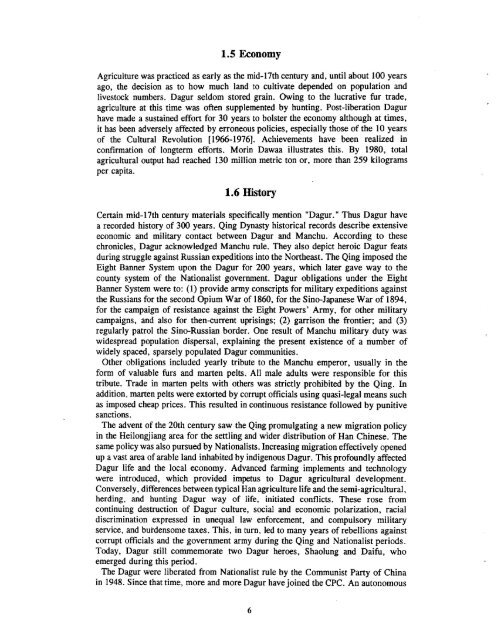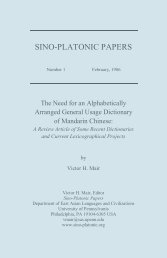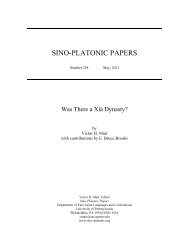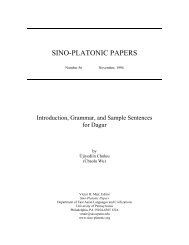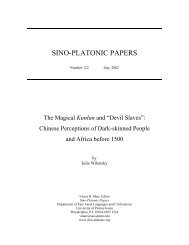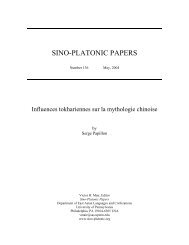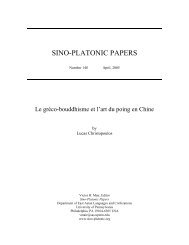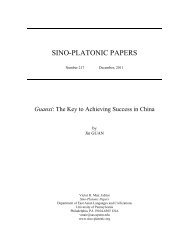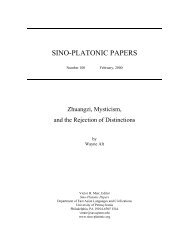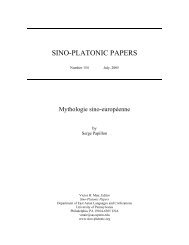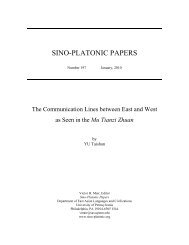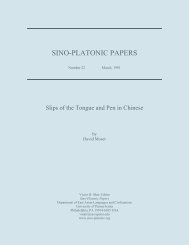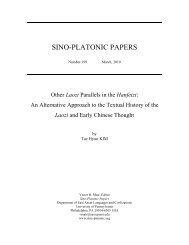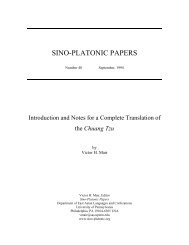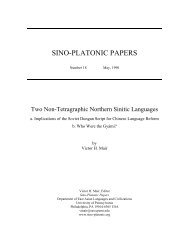China's Dagur Minority - Sino-Platonic Papers
China's Dagur Minority - Sino-Platonic Papers
China's Dagur Minority - Sino-Platonic Papers
Create successful ePaper yourself
Turn your PDF publications into a flip-book with our unique Google optimized e-Paper software.
1.5 EconomyAgriculture was practiced as early as the mid-17th century and, until about 100 yearsago, the decision as to how much land to cultivate depended on population andlivestock numbers. <strong>Dagur</strong> seldom stored grain. Owing to the lucrative fur trade,agriculture at this time was often supplemented by hunting. Post-liberation <strong>Dagur</strong>have made a sustained effort for 30 years to bolster the economy although at times,it has been adversely affected by erroneous policies, especially those of the 10 yearsof the Cultural Revolution [ 1966-19761. Achievements have been realized inconfirmation of longterm efforts. Morin Dawaa illustrates this. By 1980, totalagricultural output had reached 130 million metric ton or, more than 259 kilogramsper capita.1.6 HistoryCertain mid-17th century materials specifically mention "<strong>Dagur</strong>." Thus <strong>Dagur</strong> havea recorded history of 300 years. Qing Dynasty historical records describe extensiveeconomic and military contact between <strong>Dagur</strong> and Manchu. According to thesechronicles, <strong>Dagur</strong> acknowledged Manchu rule. They also depict heroic <strong>Dagur</strong> featsduring struggle against Russian expeditions into the Northeast. The Qing imposed theEight Banner System upon the <strong>Dagur</strong> for 200 years, which later gave way to thecounty system of the Nationalist government. <strong>Dagur</strong> obligations under the EightBanner System were to: (1) provide army conscripts for military expeditions againstthe Russians for the second Opium War of 1860, for the <strong>Sino</strong>-Japanese War of 1894,for the campaign of resistance against the Eight Powers' Army, for other militarycampaigns, and also for then-current uprisings; (2) garrison the frontier; and (3)regularly patrol the <strong>Sino</strong>-Russian border. One result of Manchu military duty waswidespread population dispersal, explaining the present existence of a number ofwidely spaced, sparsely populated <strong>Dagur</strong> communities.Other obligations included yearly tribute to the Manchu emperor, usually in theform of valuable furs and marten pelts. All male adults were responsible for thistribute. Trade in marten pelts with others was strictly prohibited by the Qing. Inaddition, marten pelts were extorted by corrupt officials using quasi-legal means suchas imposed cheap prices. This resulted in continuous resistance followed by punitivesanctions.The advent of the 20th century saw the Qing promulgating a new migration policyin the Heilongjiang area for the settling and wider distribution of Han Chinese. Thesame policy was also pursued by Nationalists. Increasing migration effectively openedup a vast area of arable land inhabited by indigenous <strong>Dagur</strong>. This profoundly affected<strong>Dagur</strong> life and the local economy. Advanced fanning implements and technologywere introduced, which provided impetus to <strong>Dagur</strong> agricultural development.Conversely, differences between typical Han agriculture life and the semi-agricultural,herding, and hunting <strong>Dagur</strong> way of life, initiated conflicts. These rose fromcontinuing destruction of <strong>Dagur</strong> culture, social and economic polarization, racialdiscrimination expressed in unequal law enforcement, and compulsory militaryservice, and burdensome taxes. This, in turn, led to many years of rebellions againstcorrupt officials and the government army during the Qing and Nationalist periods.Today, <strong>Dagur</strong> still commemorate two <strong>Dagur</strong> heroes, Shaolung and Daifu, whoemerged during this period.The <strong>Dagur</strong> were liberated from Nationalist rule by the Communist Party of Chinain 1948. Since that time, more and more <strong>Dagur</strong> have joined the CPC. An autonomous


